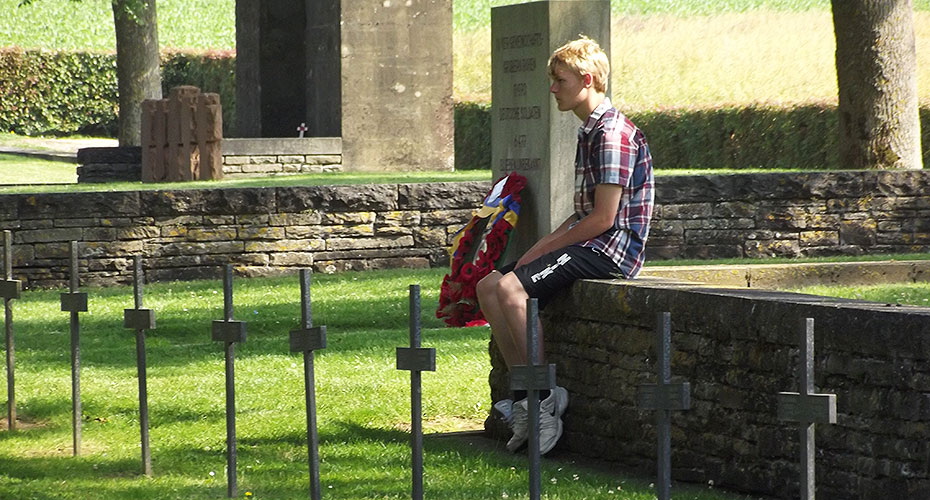‘The First World War in the Classroom’ was supported by the Arts and Humanities Research Council (2013-14).
Catriona Pennell, ‘Learning lessons from war? Inclusions and Exclusions in Teaching First World War History in English Secondary Schools’. History & Memory 2016 28 (1), pp.36-71
Catriona Pennell ‘On the Frontlines of Teaching the History of the First World War’ in Teaching History June 2014 (TH 155), pp. 34-40
Ann-Marie Einhaus and Catriona Pennell, ‘The First World War in the Classroom: Teaching and the Construction of Cultural Memory’ in Remembering the Great War edited by Bart Ziino (Routledge, Oxford, 2014)
May 2014 ‘The First World War in the Classroom: Final Project Report’ with Ann-Marie Einhaus. Please visit the project website for further information.
The First World War in the Classroom: Teaching and the Construction of Cultural Memory
The First World War in the Classroom
The First World War in the Classroom
Dr Catriona Pennell (Exeter) and Dr Ann-Marie Einhaus (Northumbria) worked with secondary –level teachers of History and English Literature from across England, alongside exam boards and organisations such as the Historical Association and the English Association, to explore the aims, methods and topics connected with teaching the First World War in the light of the war’s centenaries (2014-2018).
This exploratory research project sought to gain greater understanding of the link between education and the way in which the First World War is perceived and commemorated at the point of its centenary anniversary. The project was about examining how the war is taught and remembered in the present, to allow us to consider its future relevance to national consciousness and cultural memory. Rather than assuming what teachers of History and English Literature were doing in the classroom on this topic – which is often the focus of criticism from politicians and public figures – Dr Pennell and Dr Einhaus worked with teachers, academics and educational policy-makers via symposiums, a national online survey and focus-groups to ensure we understand more fully what is already happening in secondary school classrooms. This involved exploring how teachers feel about teaching the subject and what their experiences have been.
Challenging perceptions
The project allowed teachers to have a central place in reflecting on the state of First World War education at the start of the centenary. Despite protestations made by politicians and the media more generally, the evidence does not exist, within this snapshot research project, to suggest that the teaching of the First World War in English secondary schools is propagating a certain, and limited, picture of the First World War. Instead, teachers of History and English Literature – at all stages of their career – utilise popular representations such as Blackadder Goes Forth and Private Peaceful as a window into deeper discussion and with a understanding that the war, since its outbreak, has been subject to multiple and contradictory interpretations. The key challenge, and greatest opportunity, in teaching the First World War is finding ways of making the war matter to new generations of students. The vast majority of teacher respondents recognised this and responded to the challenge by, for instance, drawing their pupils in through established family or local links to the war. Moving forward, the findings of this research project have formed the basis of policy recommendations to national level curriculum setters and exam boards about the way the subject is taught in History and English Literature, as well as framing some of the government’s youth-focused centenary activity. The project has therefore provided a new platform for reflective and critical engagement with the way (and why) the First World War is taught and commemorated in England.
Media interest
The project’s research attracted national and international media interest. In January 2014, Dr Pennell was invited to comment in the national press on remarks made by the former Secretary of State for Education, Michael Gove, about the way the First World War was taught in British history classrooms. See BBC History Extra as an example. Dr Pennell was interviewed on local and national television about the project. The findings from this research project underpinned the development of the UCL/IOE’s award winning First World War Centenary Battlefield Tours National Education Programme (FWWCBTP) funded by the Department for Education and the Department for Communities and Local Government. Since the start of 2015 Dr Pennell has acted as the Academic Lead on pupil evaluation for this programme. The findings of the 2015 survey are already being used to help determine the content and structure of the programme’s educational activities for next year. In addition Dr Pennell sits on the programme’s Academic Advisory Board which meets three times a year and provides invaluable expertise about all aspects of First World War history.

